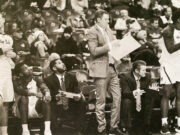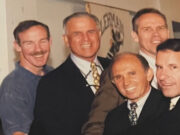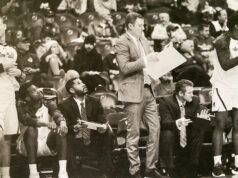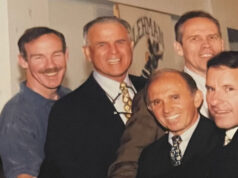by Miguel Humara, Ph.D.
“Dad, I want to play on the _______ team!” In today’s world, many of our children are beginning to participate in organized sports at a young age. Unfortunately, we also have many demands on our time as well. Most experts in child mental health will tell you that in order to have a good relationship with your child, you need to put in the time. If your youngster is playing sports , then you are going to have to be involved with the team. Simply dropping them off at practices and going to games is not enough. More and more of us are getting involved with coaching kids, often with very little idea of what this involves. Whether it be soccer, baseball, or football, there are some basic guidelines that new coaches need to follow.
Coaching Styles
First off, decide on your coaching style. What type of coach are you going to be? Usually a coach’s style will fall into one of three categories: command, submissive or cooperative. Command style coaches make all the decisions and the young athlete is supposed to simply respond to orders. Submissive coaches make as few decisions as possible which can result in a great deal of chaos. Cooperative coaches recognize their role as the team leader but share some of the decision making with athletes.
Next, it is important to make parents and athletes aware of your coaching style and expectations. A pre-season meeting can go a long way to establishing this and can minimize problems later. You should discuss specific expectations such as practice attendance, season goals, selection of team captains, and game participation by team members. Practical considerations including transportation, additional costs, and post game celebrations should also be addressed at this meeting to avoid confusion down the road.
Practice
Emphasize the basic skills, understanding of the rules, and elementary team tactics particular to the sport. After they do their warm-ups and stretching, introduce a new technical or playing skill simply, with well-prepared demonstrations and reinforcement. Have the kids repeat it until it becomes automatic. Using simple key words that help the youngsters remember the skill and its sequence is very helpful. Have them do the skill individually, then in pairs and finally in larger groups.
Although they will be working as a team, children respond well to being treated like individuals. Little things like using their name, greeting each one as they arrive, or noticing an improvement by a child with little athletic ability can go a long way. It is important to encourage and make them feel welcome and appreciated. Make sure to speak to each child at EVERY practice. Remember that you are a role model to these kids and how you treat them is how they will treat each other.
Always adapt to the level of your athletes. Ask yourself what is their ability level? Are they novices or do they have some experience? It is most likely that you will encounter a situation with a mix of both types. Be realistic in your expectations of these kids. One can hardly expect the same level of performance from a child who is just starting out as of another who has played for three seasons. Although practices should be challenging so that they develop their skills, they should experience more success then failure as a group. You should also try to vary the drills that you use, otherwise there is the danger of boredom setting in at which point practices become about crowd control not the sport.
All too often new coaches become overly critical. It is important to praise our young athletes for their successes. Praise can be verbal or non-verbal. A smile, nod, pat on the head, or clapping can mean as much as saying “Good job!” Remember to praise not just their athletic accomplishments but their effort and sportsmanship as well. It is also important to give specific feedback when giving this praise. What did they do well? What can they improve? They are more likely to repeat a behavior if they know what they did right. “Good job, Joe. Way to keep your eye on the ball!” You can also use this as an opportunity to correct them so that even failures can be turned into a positive learning experience. “Good try! Follow through the ball with your bat and you’ll get it the next time.” Do not create situations which allow an opportunity for a player to feel put down. Again you are acting as a role model, and how you treat them is how they will treat each other.
Develop them into a team. Give responsibilities to all individuals and involve the kids in decision making. Talk to them about how team captains will be selected and how often they will be changed. This even applies to the position that they will be playing. Almost all kids want to be the pitcher, quarterback or goalie, why not give them all a shot? Don’t allow yourself to fall into the trap of labeling an individual and you just might find that they have other abilities as well. Make sure that they work with different children each practice and not develop groups that exclude some individuals. Have them work towards a common goal and finish each practice so that they have some sense of accomplishment every time.
Game Days
On game day, make an effort to talk with parents and care takers. Be positive and supportive of their children and make sure to listen to their feedback. The more information you have about your players, the better they will do. This is specially important when parents see their children differently then you do. Maybe you will get a better sense of what motivates their kids.
Discuss the goals for that day and be sure that everyone on the team knows their assignment. During your pre-game pep talk, stay positive and they will too. Remember that you are a role model. The way they see you react to events on the field is going to have a significant impact on the way they react. Show them the right ways to accept winning and losing. Don’t allow yourself to fall into the all too common mistake of becoming overly competitive. Be sure that they understand that at their age the point of the sport is to do their best and try hard regardless of the end result. After all, it is supposed to be fun.
Conclusion
With more and more kids playing organized sports, parents are entering coaching roles often for the first time. The skill that is most needed by new coaches in order to nurture these young athletes is the ability to communicate – not just with the kids but with the parents as well. In youth sports the goal should be enjoyment and effort, not winning. Communicate this to all not just verbally but by modeling it as well. Emphasize the basic skills and give reinforcement for a job well done. Remember, sports provide youngsters with many physical and psychological benefits. Their first experiences will have a significant impact on their future participation.













